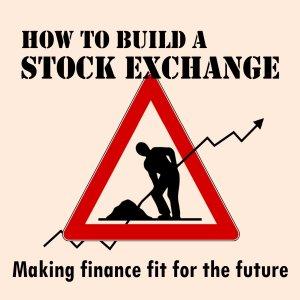How to Build a Stock Exchange

Episode 11. UK plc
In 1995 the London Stock exchange set up its junior market, AIM, an engine for UK plc. This episode explores how the narrative of entrepreneurial Britain brought this new market into being. That’s how the story goes, at least. The history turns out to be a little more complicated. This episode looks back to London of the mid 1990s, as a the country found itself transformed by the new dynamism of globalization. There’s a little bit of social theory, and in coming episodes we’ll be seeing stories through the eyes of a much younger me, so I get an introduction too. [Warning: some market vulgarity in this episode.]
Transcription
In August 1999 I was twenty-five years old and didn’t have a clue what I was doing. I like to think that makes me one of the good guys, an innocent swept up in the maelstrom of dotcom speculation, but in truth it made me into kind of collaborator, happy to be wined and dined and to repeat the lines that I was spun by the less scrupulous as they promoted their wares to a credulous and excited public. I was naive enough not to realise that regular lunches at London’s finest restaurants do not come free; that there is always a reason, and that someone is always paying. Besides, I wasn’t long out of university and in my sheltered life no one had really lied to me before. Not the barefaced lies of the kind I was to encounter as a journalist. No one had ever sat there, leaned back, puffed on a cigar, looked me in the eye and told me a barefaced, million-dollar lie.
I was a young reporter at the newly formed Shares Magazine. I liked the job. I liked the deal it came with even more: being handed the first gin and tonic as the hour hand crept towards one pm; riding across London in the back of a black Mercedes, on the way to air my views in a television studio at Bloomberg or the Money Channel; the buzz of young colleagues and new technology and the sense that the world was changing for the better. I liked the fact that a mysterious woman called Bella, whom I never met, used to telephone me regularly for syndicated radio news bulletins that I was never up early enough to hear. Most of all, I liked the smell of money being made and believed that somehow, in a small way, some of it could be mine. When one is twenty-something and impoverished student days are a very real memory, it is a fine thing indeed to be a stocks and shares hack in the middle of a boom.
Those who only know London now can’t begin to imagine how different it was just twenty years ago. There was no Gherkin towering over the London skyline, no Shard on the south bank. The tallest building in the city was the Tower 42: most people still thought of it as the NatWest Tower and could remember the plume of smoke trailing from the top after the IRA bombed it in 1993. There was no Facebook, no YouTube. Alta Vista was the go-to web search engine, and the smartphone remained a developer’s dream. If you wanted to ‘go on the Internet’ at home you plugged a cable from your computer into the phone socket and listened to beeps and wheezes as the connection dials up. No one had ever heard of al-Qaeda.
But times were changing.
Hello, and welcome to How to Build a Stock Exchange. My name is Philip Roscoe, and I teach and research at the University of St Andrews in Scotland. I am a sociologist interested in the world of finance and I want to build a stock exchange. Why? Because, when it comes to finance, what we have just isn’t good enough. If you’ve been following this podcast – and if so thank you – you’ll know that I’ve been talking about how financial markets really work, and how they became so important. I’ve been deconstructing markets: the wires, and screens, the buildings, the politics, the relationships, the historical entanglements that make them go, all in the hope of helping you understand how and why finance works as it does. In the second part of this podcast series,






 Visit Podcast Website
Visit Podcast Website RSS Podcast Feed
RSS Podcast Feed Subscribe
Subscribe
 Add to MyCast
Add to MyCast